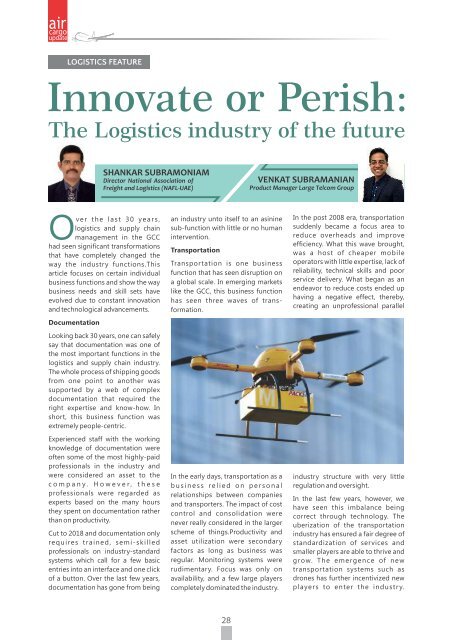Create successful ePaper yourself
Turn your PDF publications into a flip-book with our unique Google optimized e-Paper software.
LOGISTICS FEATURE<br />
Innovate or Perish:<br />
The Logistics industry of the future<br />
SHANKAR SUBRAMONIAM<br />
Director National Association of<br />
Freight and Logistics (NAFL-UAE)<br />
VENKAT SUBRAMANIAN<br />
Product Manager Large Telcom Group<br />
Over t h e l a s t 3 0 years,<br />
logistics and supply chain<br />
management in the GCC<br />
had seen significant transformations<br />
that have completely changed the<br />
way the industry functions.This<br />
article focuses on certain individual<br />
business functions and show the way<br />
business needs and skill sets have<br />
evolved due to constant innovation<br />
and technological advancements.<br />
Documentation<br />
Looking back 30 years, one can safely<br />
say that documentation was one of<br />
the most important functions in the<br />
logistics and supply chain industry.<br />
The whole process of shipping goods<br />
from one point to another was<br />
supported by a web of complex<br />
documentation that required the<br />
right expertise and know-how. In<br />
short, this business function was<br />
extremely people-centric.<br />
Experienced staff with the working<br />
knowledge of documentation were<br />
often some of the most highly-paid<br />
professionals in the industry and<br />
were considered an asset to the<br />
c o m p a n y . H o w e v e r , t h e s e<br />
professionals were regarded as<br />
experts based on the many hours<br />
they spent on documentation rather<br />
than on productivity.<br />
Cut to <strong>2018</strong> and documentation only<br />
requires trained, semi-skilled<br />
professionals on industry-standard<br />
systems which call for a few basic<br />
entries into an interface and one click<br />
of a button. Over the last few years,<br />
documentation has gone from being<br />
an industry unto itself to an asinine<br />
sub-function with little or no human<br />
intervention.<br />
Transportation<br />
Transportation is one business<br />
function that has seen disruption on<br />
a global scale. In emerging markets<br />
like the GCC, this business function<br />
has seen three waves of transformation.<br />
In the early days, transportation as a<br />
b u s i n e s s r e l i e d o n p e r s o n a l<br />
relationships between companies<br />
and transporters. The impact of cost<br />
control and consolidation were<br />
never really considered in the larger<br />
scheme of things.Productivity and<br />
asset utilization were secondary<br />
factors as long as business was<br />
regular. Monitoring systems were<br />
rudimentary. Focus was only on<br />
availability, and a few large players<br />
completely dominated the industry.<br />
In the post 2008 era, transportation<br />
suddenly became a focus area to<br />
reduce overheads and improve<br />
efficiency. What this wave brought,<br />
was a host of cheaper mobile<br />
operators with little expertise, lack of<br />
reliability, technical skills and poor<br />
service delivery. What began as an<br />
endeavor to reduce costs ended up<br />
having a negative effect, thereby,<br />
creating an unprofessional parallel<br />
industry structure with very little<br />
regulation and oversight.<br />
In the last few years, however, we<br />
have seen this imbalance being<br />
correct through technology. The<br />
uberization of the transportation<br />
industry has ensured a fair degree of<br />
standardization of services and<br />
smaller players are able to thrive and<br />
grow. The emergence of new<br />
transportation systems such as<br />
drones has further incentivized new<br />
players to enter the industr y.

















